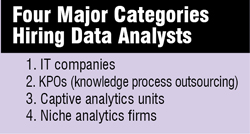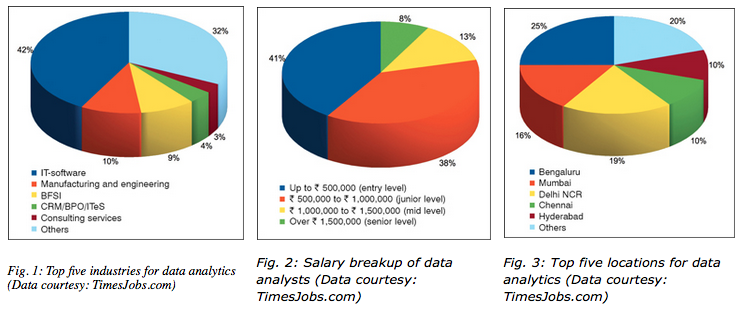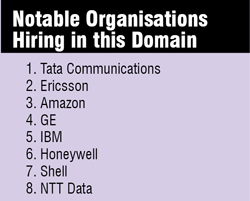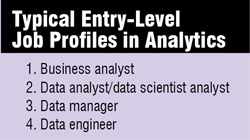Today, most of the jobs available in data analytics (DA) are for computer science graduates, but there are some companies that particularly look for electronics engineers. An engineering degree with a knack for programming, statistics and mathematics is the latest choice for employers hiring in the DA domain.
Anand Sankaran, senior principal architect, Verizon Data Services, India informs that many universities in the US, Europe and India have started specialised courses both at graduate and undergraduate levels to cater to the increasing demand for DA professionals.
universities in the US, Europe and India have started specialised courses both at graduate and undergraduate levels to cater to the increasing demand for DA professionals.
The exponential growth in DA is catalysed by an unprecedented availability of data, thanks to a steep fall of storage cost and the ubiquitous need to extract valuable insights from a volume of data to solve business problems. He says, “A recent article in the Harvard Business Review predicts that DA will be one of the coolest and the fastest growing career paths in the coming decade, and we have seen studies that highlight a shortfall of qualified candidates to meet the job requirements in this space.”
Why engineers
Basically, engineers have a good blend of learning in technology, mathematics and data science. Sudeshna Datta, EVP and co-founder, Absolutdata says, “Engineers have been critical to the growth of the analytics market in India and are very apt to make a career in DA. To add, now there are institutions who help engineers learn the basics of machine learning and big data in the curriculum.”

However, Ashish Soni, chief analytics officer, Costarch believes that engineering graduates fit into the area of DA only if they have an inclination towards number crunching. Their quantitative and computer skills give them the competitive edge that graduates from other streams do not have. In short, he says, “If an engineering graduate is looking for a career in data analytics, he/she should focus on improving his/her numerical computation skills, learn some numerical programming language and explore the area of statistics.”
Engineering graduates with a good knowledge of programming and business can have a  well-defined career path in this sector. Harvard Business School predicts that there is a serious dearth of data scientists in the US alone. “With open data movements gathering steam across the world, scope for engineering graduates to make a career in data analytics is huge,” says Kaushank Nalin Khandwala, manager, Data Centre and Analytics Lab, IIM Bangalore.
well-defined career path in this sector. Harvard Business School predicts that there is a serious dearth of data scientists in the US alone. “With open data movements gathering steam across the world, scope for engineering graduates to make a career in data analytics is huge,” says Kaushank Nalin Khandwala, manager, Data Centre and Analytics Lab, IIM Bangalore.
Current opportunities for engineers
In the coming decade, social, mobile, analytics and cloud (SMAC) are the strategic focus areas for many technology companies. The entry-level roles in analytics are in the areas of data modelling, data visualisation, business analysis and reporting.
Apart from their core field, engineers are now hired by IT companies, KPOs, captive analytics units and niche analytics organisations across various entry-level roles, such as management trainees, analysts and assistant managers in the risk, marketing and analytics consulting roles. Over the last 14 months, the spike in big data roles has also added to the mix.
There are a lot of opportunities for fresh engineering graduates who have the right kind of skill set. The entry-level roles generally involve a profile where the graduates are required to aggregate, compile and screen the data and also prepare a datasheet for further analysis. In addition, they may also be asked to explore the data to find some insights before applying any data analysis technique.
skill set. The entry-level roles generally involve a profile where the graduates are required to aggregate, compile and screen the data and also prepare a datasheet for further analysis. In addition, they may also be asked to explore the data to find some insights before applying any data analysis technique.
For engineers, roles will also be of programmers, specifically for Java, Python and R.
Freshers with good knowledge of Hadoop and cloud computing will have a distinct advantage.
For experienced graduates, roles range from business intelligence specialists, programmers, open source experts to Hadoop engineers, cloud computing experts, Java, Python, text mining specialists and domain specialists.
programmers, open source experts to Hadoop engineers, cloud computing experts, Java, Python, text mining specialists and domain specialists.






